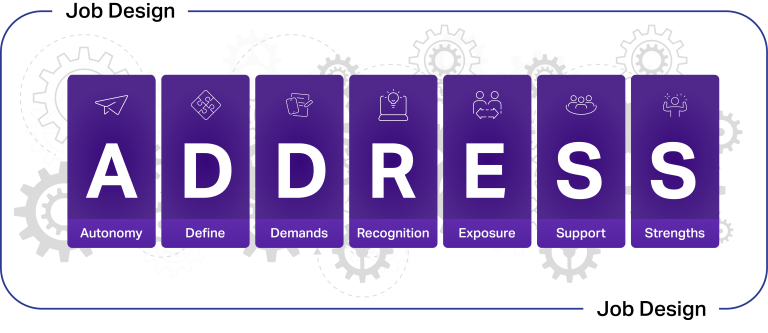
Launched by the Australian Public Service (APS) Mental Health and Suicide Prevention Unit (the Unit), located within the Australian Public Service Commission (APSC), ADDRESS: An APS model for responding to psychosocial hazards is a first-of-its-kind suite.
Autonomy, Define, Demands, Recognition, Exposure, Support and Strengths (ADDRESS) represent areas of job design to assist agencies understand how particular work factors can contribute to psychosocial hazards in the workplace. These factors can include workplace behaviours and interactions or how a job’s role and duties are designed.
In response to a review of Australia’s Work Health and Safety (WHS) laws in 2018-2019, Safe Work Australia released the Model Code of Practice: Managing psychosocial hazards at work; however, a gap in the market for practical tools to meet these laws was identified by The Unit.
HR Practitioners, line managers, WHS and HSR teams within the APS can utilise the ADDRESS model, which consists of guides and supporting resources to step through the identify, assess, control and review process. It also includes slide decks with talking points to help facilitate staff consultation to appropriately assess and review the efficacy of controls. The model will be updated in accordance with any changes made to the Model Code of Practice and is meant to complement existing organisational WHS policies and processes.
Ahead of its release, the Department of Prime Minister and Cabinet and the Australian Institute of Health and Welfare piloted ADDRESS in a real world setting to ensure the model was fit for an APS operating context. An expert Secondary Review Panel consisting of senior representatives from various agencies, subject matter experts and academics, was established to endorse the model. The key outcome from the Panel review was that the model is practical and adaptable to different agency contexts and the resources developed can be amended to suit an agency’s needs including being complementary to existing organisational policies and processes.
One of the unique features of the ADDRESS model is the use of existing APS organisational data to help identify psychosocial hazards. The APS Employee Census Psychosocial Hazard Mapping screener utilises existing Census data to heat map risks as they align to ADDRESS factors and allows agencies to leverage data without creating additional work demands or survey fatigue.
For agencies where using Census data is not suitable, for example due to small work areas or significant restructuring within the last reporting period, an alternative 30-item hazard identification screener has been developed that supports the assessment of psychosocial hazards against the ADDRESS framework. The model also includes examples of evidence-based controls aligned to the framework as suggestions for agencies to consider for implementation.
These guides and resources are available at no cost to APS agencies through APSLearn under the APS Mental Health Capability Hub.
Reinforcing the APS’s commitment to being a model employer in creating and fostering a safe and mentally healthy work environment for all, the ADDRESS model is designed to be a driving force behind a whole-of-APS approach to psychosocial hazard identification and intervention for the service.
You can contact the APS Mental Health and Suicide Prevention Unit on MHSP@apsc.gov.au if you would like more information on how to utilise ADDRESS in your workplace.



